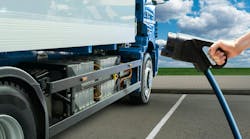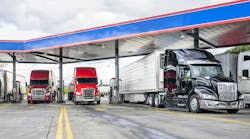The Volvo Group of Sweden, parent of Volvo Trucks North America and Mack Trucks Inc., has announced it will be the world’s first vehicle manufacturer to join the World Wide Fund for Nature’s (WWF) Climate Savers Program. As a WWF partner, the Volvo Group’s truck companies will undertake to reduce CO2 emissions from vehicles manufactured between 2009 and 2014 by 13 million tons. Independent technical experts will oversee the results, the OEM stated.
“The partnership with WWF means that we are raising our already ambitious goals in relation to cutting the CO2 emissions of our products, said Volvo Group’s CEO Leif Johansson. “Our shared vision is that future transport will be CO2-neutral. It won’t be easy, but if anyone can do it – Volvo can.”
The World Wild Fund for Nature (WWF) is one of the world’s largest and most respected environmental organizations. Volvo Group noted the organization’s “vision is to stop the degradation of the planet's natural environment and build a future in which humans live in harmony with nature.”
The WWF Climate Savers Program is mobilizing multinational companies to cut their emissions of CO2. The “Climate Savers” companies promise to reduce their CO2-emissions in accordance with an agreement between the WWF, the given company and independent technical experts. The agreed goal must be more ambitious than what the company has planned before, and also means that the company will lead its own industry in the reduction of greenhouse gases, Volvo Group pointed out.
The agreement between The Volvo Group and WWF will apply for the Volvo Group’s truck companies: Mack Trucks, Volvo Trucks, Renault Trucks, and UD Trucks.
Under the agreement, the total amount of CO2 emitted during their lifetime by trucks manufactured and sold between 2009 and 2014 will be cut by 13 million tons compared with 2008 models by introduction of cutting-edge fuel economy technologies, said Volvo Group, noting that amount “equals the total amount that is being emitted from Sweden in three months.”
Volvo Group said it has specifically committed to:
- Producing a truck prototype with 20% lower fuel consumption than the equivalent 2008 model.
- Being able to offer trucks in the commercial market that run on “renewable gas” before 2014.
- Reducing CO2 emissions from its production plants by 0.5 million tons (12%) before 2014, compared with 2008.
Independent technical experts will annually monitor and oversee that the Volvo Group complies with its undertaking, stated the OEM.
“This is the first time we’ve engaged an outside party-- in this case, the world’s largest environmental organization-- to oversee that we deliver what we’ve promised. That is unique for a global vehicle manufacturer,” said Johansson.
According to Volvo Group, its environmental initiatives are driven by three integrated factors: legislation in the area; the Volvo Group’s own initiative to create the best products possible without compromising customers or the environment, and external partnerships.
“As the first vehicle manufacturer to be selected to participate in the Climate Savers Program we have been presented with a real challenge, but by focusing on lower CO2-emissions, we believe that we can create more value for our customers’ business while


